- Home
- Christie Ridgway
Must Love Mistletoe
Must Love Mistletoe Read online
Christie RIDGWAY
Must Love Mistletoe
With thanks to the “Mayberry Moms,”
who didn’t hesitate to help me out
by scheduling our Christmas happy hour,
uh, “meeting” in Coronado.
Cheers!
Contents
Chapter 1
Fingers hovering at the switches by the front door, Bailey…
Chapter 2
With the door shut behind that mysterious figure next door,…
Chapter 3
It was after midnight when Bailey left the shop and…
Chapter 4
During hours lying in bed and hours working in the…
Chapter 5
From the master bedroom, Tracy heard her daughter leave the…
Chapter 6
Bailey had showered after coming home from work and scrunched…
Chapter 7
“Finn, you know I love you, but watching you pace…
Chapter 8
“You’re supposed to be nice to Santa,” Finn hissed, the…
Chapter 9
Perhaps it was the highlights in her hair that brightened…
Chapter 10
Finn watched Tanner slide a cup of coffee onto the…
Chapter 11
Dan found the woman of his dreams standing in the…
Chapter 12
Propped against the headboard, Trin lay on Bailey’s bed, studying…
Chapter 13
Towing Bailey in the direction of his loft, Finn knew…
Chapter 14
Tracy clutched an armful of glossy papers to her chest…
Chapter 15
Movie night. In The Perfect Christmas’s back room, Bailey cursed…
Chapter 16
When Finn returned to The Perfect Christmas bearing a pink…
Chapter 17
After that night in The Perfect Christmas, Bailey gave up…
Chapter 18
Finn watched Bailey close the door to The Perfect Christmas,…
Chapter 19
Tracy tried everything she could to control her anger. She…
Chapter 20
Finn’s cell phone rang at four in the morning. He…
Chapter 21
“Of course I told them no.” Bailey rocked from one…
Chapter 22
Bailey drove directly to Hart’s. It was the same as…
Chapter 23
Finn saw in another dawn. Three days ago it had…
Chapter 24
The cyclone fence gate clanged shut, a depressing sound to…
Chapter 25
“You’re sure you won’t stay for Christmas dinner?” her mother…
Author’s Note
About the Author
Other Books by Christie Ridgway
Copyright
About the Publisher
* * *
Bailey Sullivan’s Vintage Christmas
Facts & Fun Calendar
December 1
St. Nicholas took pity on a family of penniless girls and tossed bags of gold through their window for dowries. The bags landed in their stockings that had been hung by the fire to dry, initiating the worldwide custom of Santa leaving gifts in stockings or shoes.
* * *
Chapter 1
Fingers hovering at the switches by the front door, Bailey Sullivan glanced over her shoulder at the interior of The Perfect Christmas and wondered what would happen if she set Santa’s beard on fire.
But the happy, arsonistic notion died a swift death. That wasn’t the answer to her problems. Surely the manufacturers of the dozens—hundreds!—of Santas in her family’s shop would have treated their respective fabric, resin, wood, or cotton-floss facial hair with flame retardant.
Damn it all.
And anyway, a visit from the Coronado, California, fire department would only make bigger the mess she’d been forced back home to put to rights. With a resigned shrug, she doused the lights and cut off Marilyn mid–“Santa Baby.” For the first time in ten hours Bailey’s ears experienced a grateful reprieve from holiday assault. Until the rattle of the jingle bells as she exited the front door, that is. But that noise was mercifully brief, and after she locked the door behind her, she closed her eyes and leaned her forehead against the cold plate glass.
One day down, twenty-four to go.
She sucked in a deep breath of night air, cooled and salted by the Pacific Ocean just a block away, and let it clear out the lingering notes of cinnamon-and-clove potpourri that was The Perfect Christmas’s signature scent. Customers Internet-ordered the stuff from all over the world, claiming it captured their very best holiday memories.
As far as Bailey was concerned, captured was the operative world. From the day she could be trusted to unwrap merchandise to the day she could run the cash register with her eyes closed, she’d been a prisoner in the two-story Victorian that housed the almost sixty-year-old family business. She’d managed to escape for the ten years between eighteen and twenty-eight, but now, just as surely as Hermie’s dental skills came in handy, just as inevitable as the foggy night that required Rudolph’s very shiny nose, she was once again held hostage.
Until December 25. Then she was outta here and back to Los Angeles and her happy holidays-less life.
Giving an emphatic nod, she almost lost the green-and-white striped hat jammed over her blond hair. With a grimace, she yanked the thing off and stuffed it in the front pocket of her red cotton and fake-fur-trimmed apron. This morning she’d driven straight from her condo in L.A. to the shop and found them hanging on their customary hook in the back office. Along with her customary nametag—her name between two peppermint sticks—that read:
BAILEY
(Yes, like George!)
Just about everyone except the Japanese tourists recognized the identity of the main character of the movie classic It’s a Wonderful Life. Just about everyone loved the idea that she’d been named after a famous Christmas character.
Just about everyone.
Gee, thanks, Mom.
Which made her think about the next item on her today’s to-do list. Heading the eleven blocks to her childhood home and confronting her mother. Bailey rested her head another moment against the cold glass, then straightened. There was nothing to it but to do it. And there was no one else to do it but Bailey.
She turned, pointing herself in the direction of her car that earlier she’d moved to the end of the block beneath one of the streetlights. Her gaze lifted to the holiday decorations suspended from the metal poles along the avenue. When she was a kid, they’d been tired-looking tinseled bells and dusty angels, but in the new millennium they were bright polyester flags depicting holiday icons like nutcrackers and snowmen. Over her silver Passat hung one stamped with a multicolored tree ornament, and beside her car was a little man in a uniform holding a ticket book.
A ticket book?
“No!” she called out, rushing down the walkway and along the sidewalk. She wasn’t going to get a citation. She couldn’t. Wasn’t being back in the shop enough? Wasn’t it already unfair that she’d be spending the night in her old twin-sized canopy bed, sleeping with her Nirvana posters instead of on her Posturepedic mattress and with her framed Picasso prints? Her day wasn’t supposed to get any worse. “Hey!”
The elderly man didn’t look up.
Bailey was going to break his busy little pencil in half. “Listen,” she said, in her meanest I-manage-a-hundred-attorney-law-firm voice, the one even the toothiest of shark-lawyers feared, “what do you think you’re doing?”
The man looked up. “Eh?” His fingers went to the hearing aid nestled in his right ear. “Bailey? Baile
y Sullivan?”
“Mr. Baer?” He used to live down the street from her family home. She supposed he still did. “What are you doing?”
He gestured to the car parked on the other side of hers. The one with “Retired Citizens Service Patrol” emblazoned on its side. It was gleaming white, official enough to have a cherry-red light on top and a sturdy-looking something that might be a cattle prod attached to the front grille. “I’m on the job.”
“Oh, well.” She tried smiling at him, hoping he’d remember some good deed she’d done for him as a kid. Maybe she’d retrieved his morning newspaper from the bushes once upon a time. “Me too. I put in a long day at the shop.”
He leaned against the side of her car as a fond smile added new wrinkles to his liver-spotted cheeks.
Inside Bailey hope surged, until she realized he was gazing not at her, but over her shoulder, at the store that was the new albatross around her neck.
“I bought my daughter her first Christmas ornament there,” he said. “She bought her daughter her first Christmas ornament there.”
“Yeah, yeah, yeah,” Bailey said. “It’s an institution.” Albatross.
“A landmark,” the old man added, then bent his head back over his book of triplicate forms.
She wasn’t going to take a ticket. “What are you, uh, writing there, Mr. Baer? Because, you see, I’m in a bit of a hurry. Mom’s home alone, probably keeping dinner warm for me, and—”
“Dan’s really moved out then?” He stopped writing to squint at her over silver-rimmed bifocals. “Heard he’s in one of those ugly condos on the bay side.”
“Um, well…” Bailey wasn’t sure if her mother and stepfather’s recent separation was public knowledge, but heck, this was 7.4-square-mile Coronado. Secrets were impossible to keep, plus perhaps she could use the sympathy to wiggle out of whatever the Retired Citizen Patrolman had written on that little form. “They’ve been living apart since September.”
Mr. Baer nodded. “Heard one won’t step inside the shop if the other one’s there.”
“That’s true too.” Which had resulted in the frantic phone calls she’d been fielding from the part-time assistant manager and the guy who did the books—both old family friends. With her mother and Dan refusing to share the same air space, no one was minding the store. During the season when they made seventy-five percent of their year’s profits, this meant the likely end to a Coronado institution. A landmark.
The bankroll that kept her mother, stepfather, and freshman-in-college younger brother living in the style to which they were accustomed.
So she’d been guilted into coming home to save the day.
“I’m leaving on the twenty-fifth, though,” she murmured.
“Eh?” Mr. Baer squinted at her again. “What’s that?”
“I’m running the store,” Bailey explained. “But only until Christmas.” By then her mother would have accepted the hard lesson Bailey had taken to heart a decade ago. She even had her own private axiom to cover it, a Christmasy twist on the famous phrase from the Robert Frost poem. “Nothing flocked can stay.”
“Eh?”
“My take on ‘Nothing gold can stay’ and my personal motto, Mr. B.” A reminder that trusting in pretty promises and the lasting strength of romantic relationships was about as sensible as believing in Santa and all his itty-bitty elves. That kind of magic didn’t exist.
“Now, about that ticket you’re working on, you can’t mean that…”
But of course he meant it for her. He even had a special measuring stick he’d made that proved she was nineteen inches away from the curb, one inch over what Coronado parking regulations allowed. And since she was an admitted perfectionist herself, Bailey took the ticket with as much good grace as she could muster.
Which meant that when he wished her a “Merry Christmas,” she managed not to flinch.
After that it was in the car and the short trip to Coronado Island’s Walnut Street. The “island,” really a peninsula, had once been a wheat farm, a whaling station, and then, in the late 1880s, it had been turned into a tourist destination thanks to the founder of a piano company and his partner, a telephone executive. The superlative Hotel del Coronado had been built first, then more streets, housing tracts, a ferry landing.
To maximize all this prime real estate, the home lots were small, hence the houses were close together. Back in the day, presumably the community planners assumed vacationers wouldn’t mind the close quarters. In modern times, the result was that the year-round residents inside the cheek-by-jowl Victorians, Craftsman cottages, and suburban ranches lived in a cozy, nosy community.
Everyone had always known her business, from the day in first grade when Jeremy Barger had kissed her, to the day she’d been caught kissing—
What the heck is that?
As she accelerated around the next corner, she could see a radioactive glow up the next block. The block of her childhood home. Spooked by the strange light, Bailey braked and peered into the distance. Maybe things had changed recently. One end of Coronado was fenced off as the North Island Naval Air Station. Perhaps the military had moved in on the residential community and built a new runway or something. Up ahead it was just that bright.
With a gentle foot on the accelerator, Bailey moved cautiously forward. At the corner of Walnut and Sixth, she stopped again, dazzled. Lights were everywhere. On mailboxes, flowerpots, bicycles. Across bushes like fishnets, rimming rooflines, marching up tree trunks, running over anything that didn’t move. Make that things that moved too. A cat skipped past, wearing a collar studded with red and green Christmas bulbs.
And music. Piped out of windows and doors and from the mouths of plastic carolers, cardboard snowmen, and poster-painted plywood angels. “Hark the Herald” clashed with “Silent Night” clashed with “O Tannenbaum.”
“Oh, ton of crud,” Bailey cursed. They’d turned her block into Christmas Central. Giant-sized presents were stacked on porches. Overstuffed Santa butts were heading down chimneys. Reindeer pawed at patches of grass.
And there, in the middle of the block, stood her childhood home. The solitary oasis of darkness. She headed for the simple porch light like it was a homing beacon. As she braked her car in the driveway, she glanced over at the neighboring drive, just a tire’s width away. A sleek SUV sat at rest, and the dark gleam of it sent another spooky little chill down her spine. It didn’t look like the kind of car their eighty-something neighbor Alice Jacobson would drive. And there was a tasteful, lacy edging of icicle lights hanging from her eaves. In the old days, Christmas lights at Mrs. Jacobson’s meant only one thing.
Finn was back.
Her driver’s door jerked open.
Bailey gasped, her heart jumping, just as it used to when she saw those Christmas lights. When she saw Finn for the first time on his biannual vacation visits.
But of course it wasn’t Finn. Thank God. “Mr. Lantz.” Recognizing her mother’s across-the-street neighbor, she held her hand against her chest to calm her heart. “Good to see you.”
So much better than Finn, whom she never expected to see again.
“Bailey-girl, it’s good to see you too.” He was beaming at her, the lights from the holiday ostentation reflecting off his bald head. “Your mother’s thrilled you’re coming home. Heck, we’re all thrilled.”
“Oh. Well. Nice.”
He was nodding. “Worried about the store, you know. It’s an institution.”
The albatross tugged hard on her neck. “A landmark.”
“Exactly.” He patted her shoulder as she slipped out of the car. “But you’ll take care of everything, sharp girl like you.”
Surrounded by overdone dazzle, nearly deafened by the dueling carols, Bailey thought longingly of the quiet and order of her anonymous Los Angeles condo building. The housing association there posted rules and regulations that prohibited just such displays as those that were right now smothering her.
It was why she’d chosen the p
lace.
Mr. Lantz didn’t seem to notice her disquiet. He beamed at her again. “I know you’ll fix things. Save the store, save the season.”
Bailey sighed, wondering what he’d think if he knew she hated the holiday. If he knew that from the day she’d left home she’d never once celebrated on December 25—except for the fact that she didn’t have to celebrate it at all. What he’d think if he realized that the “sharp girl” assigned to save The Perfect Christmas was in fact a certified, holiday-hating Scrooge.
Bailey speed-rolled her suitcase along the path to her mother’s front porch, eager to escape the cacophony of merry tunes tumbling down the narrow street. But with the solid brick steps leading to the front door beneath her feet, she paused.
Just as The Perfect Christmas had been her maternal grandparents’ store, this had been her maternal grandparents’ house. The most stable thing in her life. The idea gave a little lift to her spirits, and the weight of the albatross eased some too.
Maybe she’d overreacted to the phone calls. Maybe she only needed a face-to-face with her mother to straighten out all their lives. Mom, here’s the deal. Dad left, and now Dan. Get over it, get back in the store, and I’ll get on my way.
It could work.
On the strength of that thought, she pushed open the front door, wearing an almost-smile. “Mom?” she called out. “It’s me. I’m here.”
Silence was the only reply, but there was the scent of food in the air, and her mother had said she’d be home all evening. Bailey left her suitcase in the entry hall and wandered past the living room in the direction of the kitchen. “Mom?”
A light glowed over the stovetop, but there wasn’t a plate on the counter or any dishes in the sink. Ghost fingers feathered over Bailey’s skin as she hurried to the staircase. The walls were lined with photos, and she couldn’t help but slow to look at them. Baby Bailey with two teeth and a pink-bowed topknot. Her brother, Harry, in footed pajamas. Stiff school photos, group shots of gymnastic teams, Little League, soccer.

 ANTE UP (7-Stud Club Book 3)
ANTE UP (7-Stud Club Book 3) Bachelor Boss
Bachelor Boss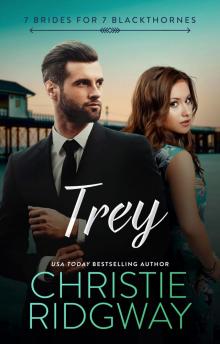 Trey
Trey Almost Paradise (Book 4)
Almost Paradise (Book 4) ALL IN (7-Stud Club Book 1)
ALL IN (7-Stud Club Book 1) My Quickie Wedding (Heartbreak Hotel Book 3)
My Quickie Wedding (Heartbreak Hotel Book 3) The Seduction (Billionaire's Beach Book 5)
The Seduction (Billionaire's Beach Book 5)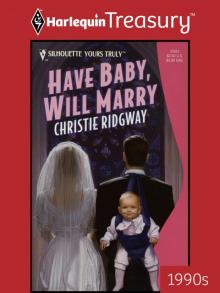 Have Baby, Will Marry
Have Baby, Will Marry Bungalow Nights (Beach House No. 9)
Bungalow Nights (Beach House No. 9) Almost Always AMAZON
Almost Always AMAZON Zane (7 Brides for 7 Soldiers Book 3)
Zane (7 Brides for 7 Soldiers Book 3) Wishful Sinful (Rock Royalty Book 5)
Wishful Sinful (Rock Royalty Book 5) SLOW PLAY (7-Stud Club Book 4)
SLOW PLAY (7-Stud Club Book 4)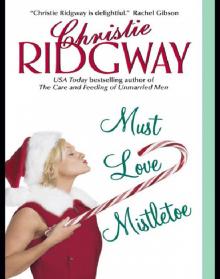 Must Love Mistletoe
Must Love Mistletoe Keep On Loving you
Keep On Loving you Light My Fire
Light My Fire Touch Me
Touch Me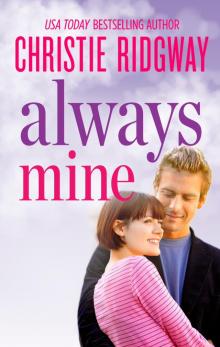 Always Mine
Always Mine Take Me Tender
Take Me Tender IN LOVE WITH HER BOSS
IN LOVE WITH HER BOSS Not Just the Nanny
Not Just the Nanny Who Do You Love (Rock Royalty Book 7)
Who Do You Love (Rock Royalty Book 7) Our Last First Kiss KOBO
Our Last First Kiss KOBO Can't Hurry Love
Can't Hurry Love Crush on You
Crush on You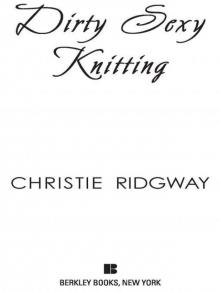 Dirty Sexy Knitting
Dirty Sexy Knitting Almost Wonderful
Almost Wonderful Beach House No. 9
Beach House No. 9 Wild Child (Rock Royalty #6)
Wild Child (Rock Royalty #6)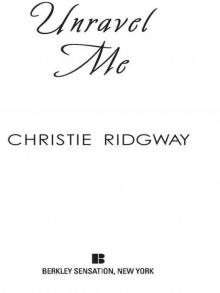 Unravel Me
Unravel Me Make Me Lose Control
Make Me Lose Control Me and Mr. Jones
Me and Mr. Jones Almost Always_Book 2
Almost Always_Book 2 Love Her Madly
Love Her Madly The Scandal (Billionaire's Beach Book 4)
The Scandal (Billionaire's Beach Book 4)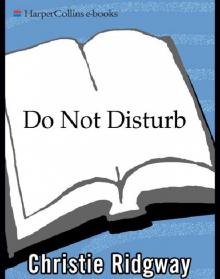 Do Not Disturb
Do Not Disturb Not Another New Year's
Not Another New Year's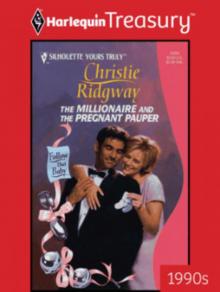 The Millionaire and the Pregnant Pauper
The Millionaire and the Pregnant Pauper The Secret (Billionaire's Beach Book 6)
The Secret (Billionaire's Beach Book 6) Beach House Beginnings
Beach House Beginnings RUNAWAY
RUNAWAY Take Me Forever (Billionaire's Beach Book 2)
Take Me Forever (Billionaire's Beach Book 2)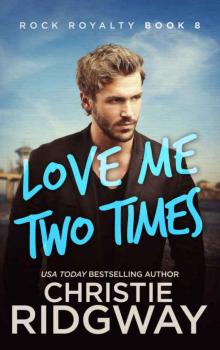 Love Me Two Times (Rock Royalty Book 8)
Love Me Two Times (Rock Royalty Book 8)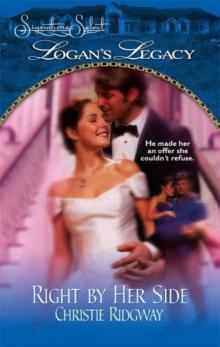 Right by Her Side
Right by Her Side Can't Fight This Feeling (Cabin Fever)
Can't Fight This Feeling (Cabin Fever)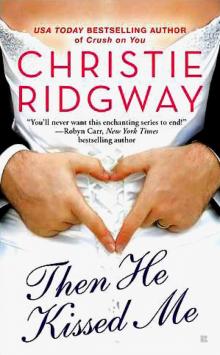 Then He Kissed Me
Then He Kissed Me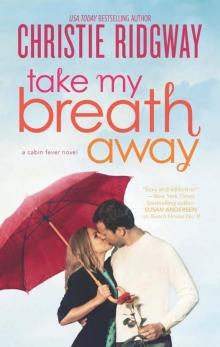 Take My Breath Away
Take My Breath Away Knox KOBO
Knox KOBO I Still Do 02 - Runaway Bride Returns!
I Still Do 02 - Runaway Bride Returns!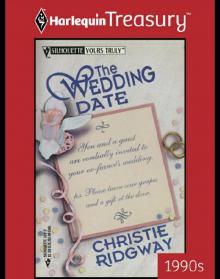 The Wedding Date
The Wedding Date THIS PERFECT KISS
THIS PERFECT KISS Me and Mr. Jones (Heartbreak Hotel Book 2)
Me and Mr. Jones (Heartbreak Hotel Book 2) The Thrill of It All
The Thrill of It All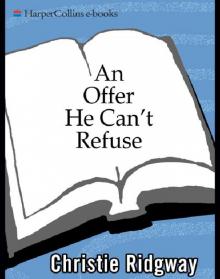 An Offer He Can't Refuse
An Offer He Can't Refuse The Love Shack
The Love Shack Runaway Bride Returns!
Runaway Bride Returns! Not Another New Year's (Holiday Duet Book 2)
Not Another New Year's (Holiday Duet Book 2) I Still Do
I Still Do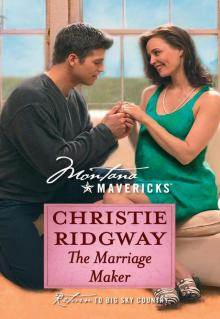 The Marriage Maker
The Marriage Maker